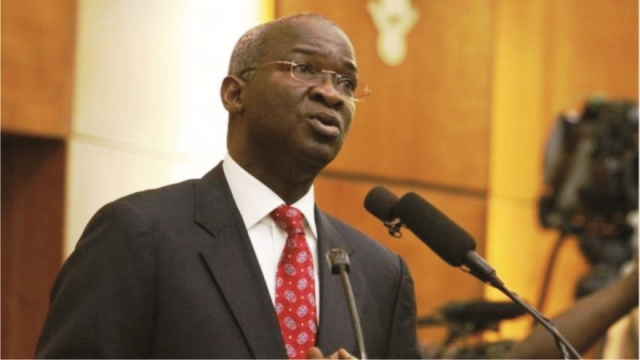Oil & Energy
Power Supply: Minister Urges Industrialists Not To Downsize

The Minister of Power,
Works and Housing Mr Babatunde Fashola, has urged entrepreneurs and industrialists not to panic or consider downsizing as an option over the current power supply challenges as the situation would soon be over.
Fashola gave the advice at the 13th Electrical and Electronics Engineers Annual Lecture held on Thursday in Lagos.
Assuring them that the country would overcome the challenge of poor power as it had overcome other critical national challenges, the minister stated that the Federal Government had put a road map in place to ensure steady power supply in the country.
He noted that the present administration inherited a privatised power sector where majority shares were sold to private companies in 2013 when government unbundled the Power Holding company of Nigeria (PHCN).
He explained further that the generation and distribution processes were sold to private companies while government retained only the transmission aspect of power which it managed through the Transmission Company of Nigeria (TCN).
At the forum which was well attended by industrialists, entrepreneurs, directors and other employers of labour, the minister said, there was no need to layoff their workers, shutdown operations, downsize or even panic over the unsteady power supply as the new road map designed by the federal government would bring the desired turn around.
The minister described the power sector which the present administration inherited as one in which the role of the government was reduced only to policy and regulation.
The Tide reports that the assurance of the minister was coming at a period when power supply was at its lowest ebb with the Port Harcourt Electricity Distribution Company (PHED) complaining of having no power to distribute except from the embedded plant source.
Owing to this challenging situation, PHED, according to the Manager, Corporate Communications, Mr Jonas Ihoma said PHED is concentrating on supplies to strategic customers while most residential customers’ supply is being rationed.
Oil & Energy
NERC, OYSERC Partner To Strengthen Regulation

Oil & Energy
NLC Faults FG’s 3trn Dept Payment To GenCos

Oil & Energy
PENGASSAN Rejects Presidential EO On Oil, Gas Revenue Remittance ……… Seeks PIA Review

-

 News3 days ago
News3 days agoAmend Constitution To Accommodate State Police, Tinubu Tells Senators
-

 Politics3 days ago
Politics3 days agoSenate Urges Tinubu To Sack CAC Boss
-

 News3 days ago
News3 days agoDisu Takes Over As New IGP …Declares Total War On Corruption, Impunity
-
Business3 days ago
President Tinubu Extends Raw Shea Nuts Export Ban To 2027
-
Business3 days ago
Crisis Response: EU-project Delivers New Vet. Clinic To Katsina Govt.
-
Sports3 days ago
NDG: Rivers Coach Appeal To NDDC In Talent Discovery
-
Rivers3 days ago
Etche Clan Urges Govt On Chieftaincy Recognition
-
Business3 days ago
President Tinubu Approves Extension Ban On Raw Shea Nut Export

